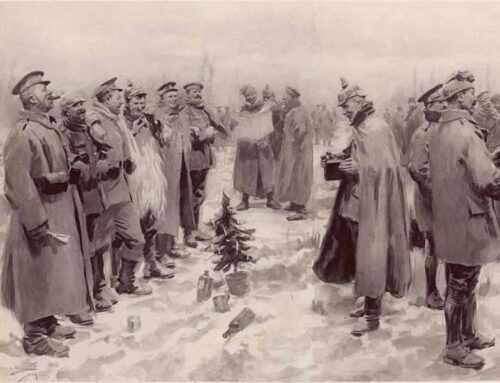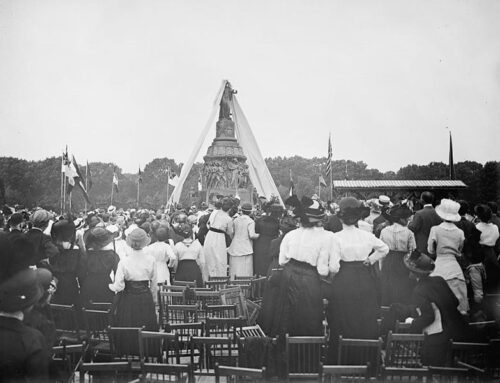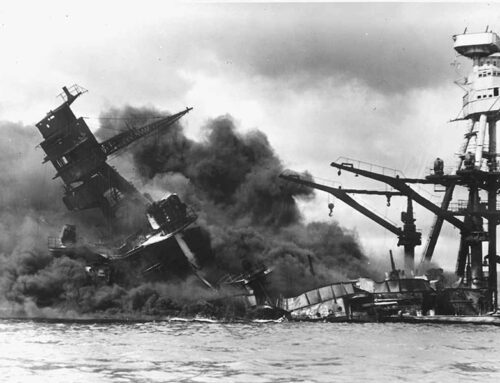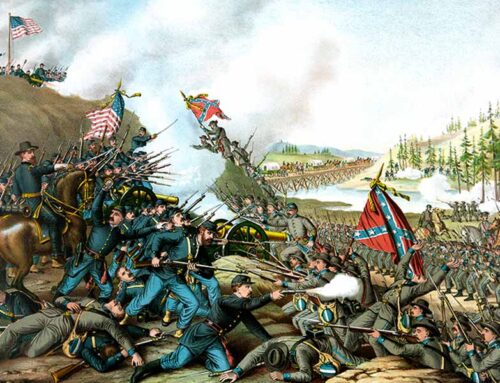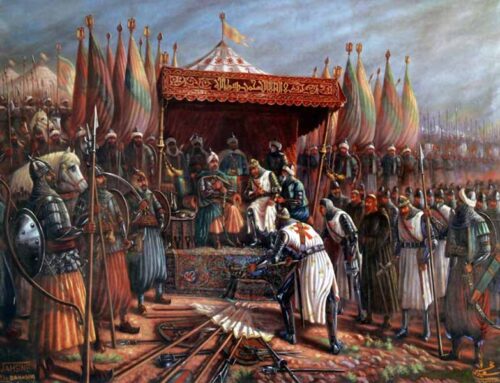“Can wicked rulers be allied with you, those who frame injustice by statute? They band together against the life of the righteous and condemn the innocent to death.” —Psalm 94:20-21
Britain Annexes Orange Free State, May 28, 1900
 uring the reign of Queen Victoria (1837-1901), England’s control of the world’s land surface equaled between 20-25%, and, by 1919, British soldiers had accumulatively through history, invaded about 90% of the nations of the world. During the reign of Victoria Rex, many “small wars” were fought to increase or create political or commercial hegemony, and to quell the revolts of those who took issue with British control. Some of those wars took but a few days or weeks of combat. The most costly by far lasted about three years and was conducted against fellow Reformed European Christians in South Africa. The Afrikaans-speaking Dutch farmers never fielded more than 33,000 men total against the British Empire, which spent the modern equivalent of 25 billion pounds, suffered 120,000 casualties, including 22,000 dead, and touched off riots and protests in London, regarding their “Boer War.” The “concentration camp” for civilians was born in the war, and the tough Afrikaners put up such a resistance to British seizure of the Orange Free State and Transvaal, that a veritable cottage industry of books after the war had titles like Someone Has Blundered, Calamities of the British Army in the Victorian Age and Into the Jaws of Death, British Military Blunders, 1879-1900.
uring the reign of Queen Victoria (1837-1901), England’s control of the world’s land surface equaled between 20-25%, and, by 1919, British soldiers had accumulatively through history, invaded about 90% of the nations of the world. During the reign of Victoria Rex, many “small wars” were fought to increase or create political or commercial hegemony, and to quell the revolts of those who took issue with British control. Some of those wars took but a few days or weeks of combat. The most costly by far lasted about three years and was conducted against fellow Reformed European Christians in South Africa. The Afrikaans-speaking Dutch farmers never fielded more than 33,000 men total against the British Empire, which spent the modern equivalent of 25 billion pounds, suffered 120,000 casualties, including 22,000 dead, and touched off riots and protests in London, regarding their “Boer War.” The “concentration camp” for civilians was born in the war, and the tough Afrikaners put up such a resistance to British seizure of the Orange Free State and Transvaal, that a veritable cottage industry of books after the war had titles like Someone Has Blundered, Calamities of the British Army in the Victorian Age and Into the Jaws of Death, British Military Blunders, 1879-1900.
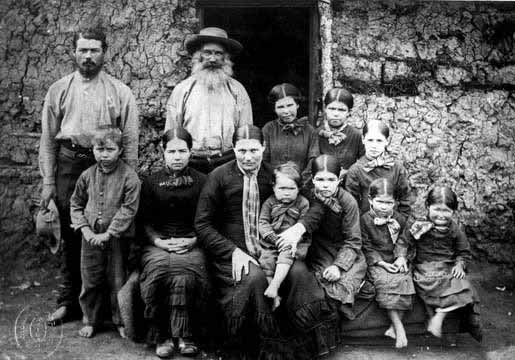
A Boer family in 1886
The Dutch have been a maritime nation for centuries. The Dutch United East India Company discovered in the middle of the 17th century that the southern tip of Africa offered a strategic resting and resupply location, not to mention retirement center, for their trading ships that plied the waters of Indonesia and Indo-China. As the Cape of Good Hope became more useful, Dutch settlers came to set up farms and businesses in South Africa and the Colony became more than just a commercial layover for Asian shipping. In 1685 France revoked the Edict of Nantes and thousands of Huguenots sailed to South Africa, thus mixing French-speaking Reformed Protestants with fellow Calvinists, the local “Free Dutch Burghers.” Those farmers and herdsmen became known as Boers (farmers) and developed their own language, Afrikaans. For various reasons they began trekking north into the more fertile lands of the continent, areas with little population but scattered native African tribes, and separated from the government of the Cape Colony. In 1795 England invaded the Cape and eventually took over politically.
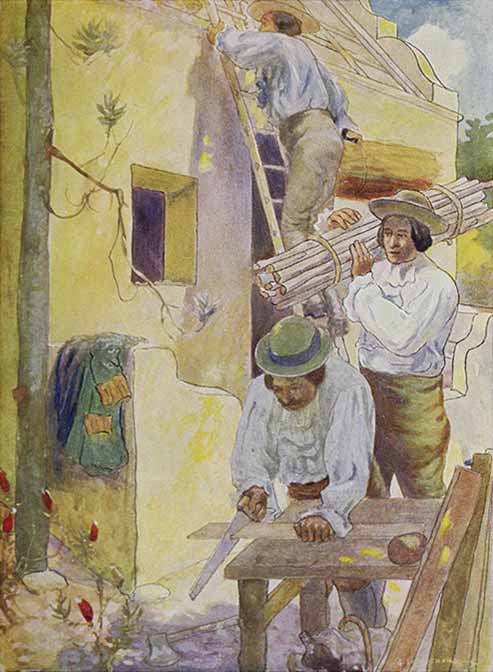
Huguenots building their homesteads in South Africa
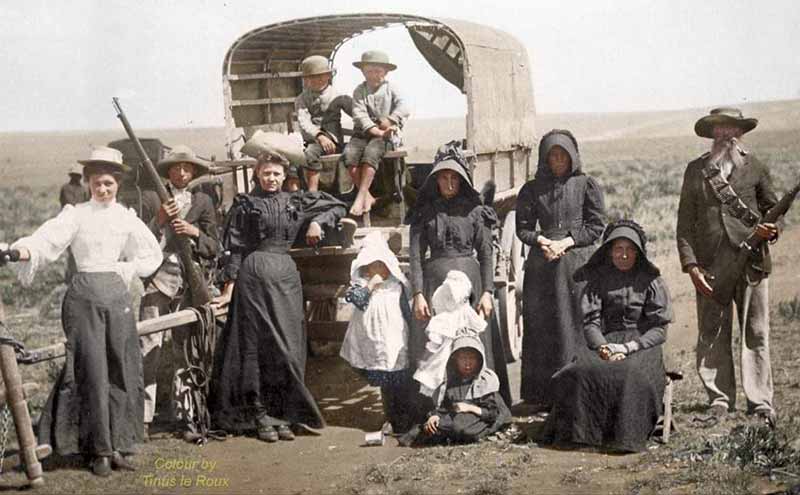
A Boer family traveling by covered wagon circa 1900
The Great Trek (1835-1840) brought about 14,000 Boers deeper into South Africa where they formed their own governments of the Transvaal and Orange Free State. The discovery of diamond fields in The Orange Free State in 1870 spurred Britain to seize the area. The discovery of gold in the Transvaal in 1886 brought British and other prospectors (Uitlanders) in a rush from around the world, and with the boom in population, the creation of the City of Johannesburg, within ten years the largest city in South Africa. The proudly independent Boer farmers did not appreciate the inundation of their country with foreigners, especially England’s gold-mining interests, and taxed them and denied voting rights to the non-citizens. In the last day of 1895 and the first two days of 1896, British colonial administrator Leander Jameson, under the command and authority of Cecil Rhodes, raided the Boer Republics with 600 men, machine guns, and artillery, hoping the Uitlanders would rise up and join the revolution. They were tracked down and defeated by Piet Cronjé. The survivors were jailed. Jameson was treated as a hero by the British public, the Kaiser in Germany congratulated President Kruger of the Transvaal for his victory, and Transvaal signed a defense treaty with the Orange Free State. Cecil Rhodes was fired as Governor of Cape Colony
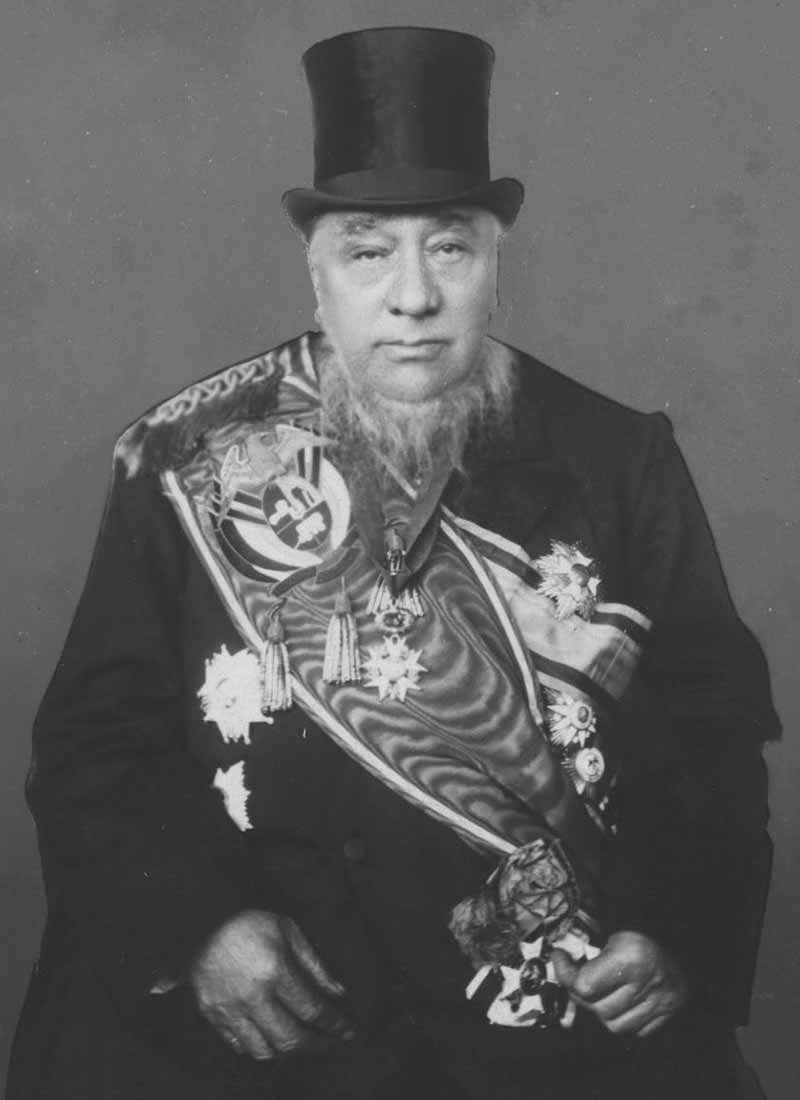
Stephanus Johannes Paulus Kruger (1825-1904) was one of the dominant political and military figures in 19th-century South Africa, as well as President of Transvaal from 1883 to 1900
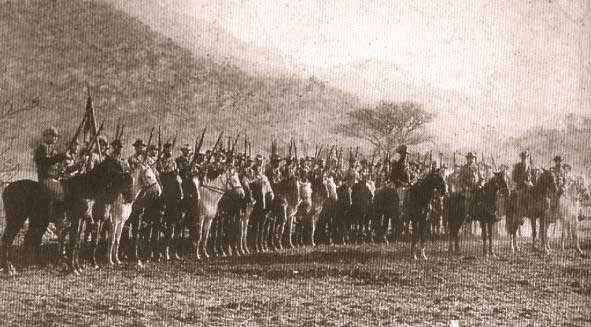
The Boer Commando assembled from Pretoria in 1899
After a century of conflict between the Boers and the British Imperialists, war broke out in November of 1899 over who would control the diamond and gold mines in the Transvaal and Orange Free States. The Boers were outnumbered in their own countries by English uitlanders, who did not have voting rights, but worked in the gold-mining industry. When the demands of President Kruger to the British army to withdraw from Boer land were refused, the Boer Republics declared war on England. Early in the war, the out-gunned and numerically smaller Boer commandos laid siege to English held towns of Ladysmith, Mefeking, and Kimberley, won tactical victories on four major battlefields, and made pre-emptive strikes in Natal and Cape Colony, winning too, the admiration of the world. Those time-consuming military confrontations bought time for Lord Roberts to mobilize armies to strike back, lift the sieges, and break up the Boer commandoes. The British ended the raids into their colony and captured the Boer capitol of Pretoria in June of 1900. For the next two years the Boers—who were master horsemen, crack shots, and stealthy guerilla fighters—harassed supply depots, tore up railroads, and attacked English outposts and patrols, suffering few losses themselves. They could fire from prone positions and sneak up on unwary British soldiers almost always exacting a toll. In May of 1900, with overwhelming numbers, the British finally lifted the siege of Mafeking, and captured Bloemfontein, the Capitol of the Orange Free State. On May 28, the British annexed the Orange Free State, renaming it Orange River Colony.
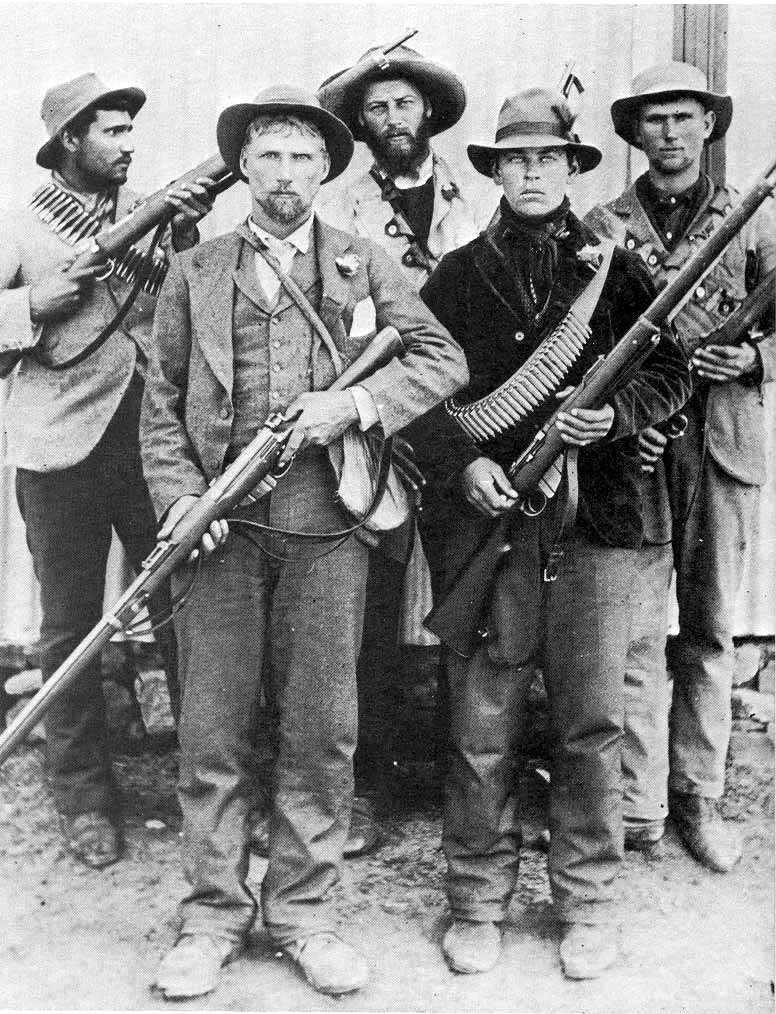
Boer guerrillas during the Second Boer War, circa 1900
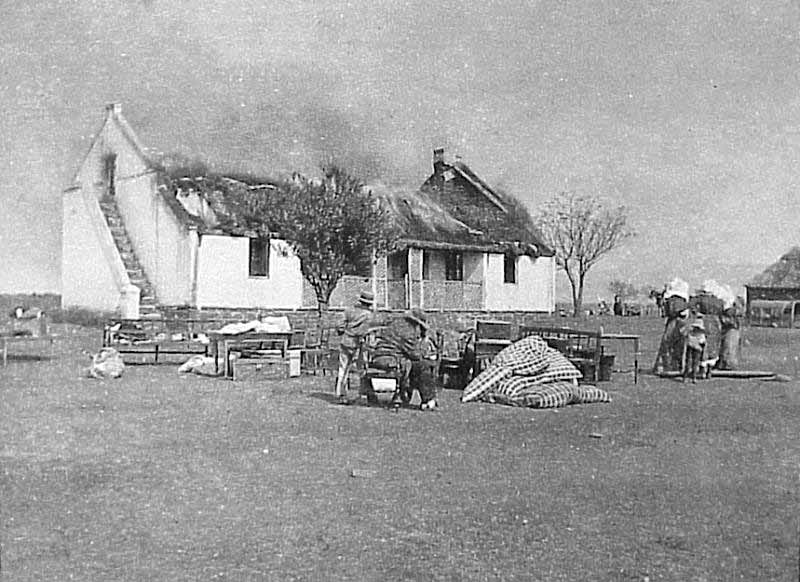
A Boer family watches their homestead burn, an example of the scorched earth policy practiced by the British army during the Second Boer War
British General Lord Kitchener conducted a scorched-earth policy against the Transvaal, reminiscent of the American Union army in Georgia and the Shenandoah Valley, by burning the fields, crops and homes of the Boer farm families. His added touch of seizing their families and incarcerating them in concentration camps succeeded in convincing the commandoes to surrender, as well as resulting in the killing off of thousands of civilians through starvation and disease in the cooped up camps.
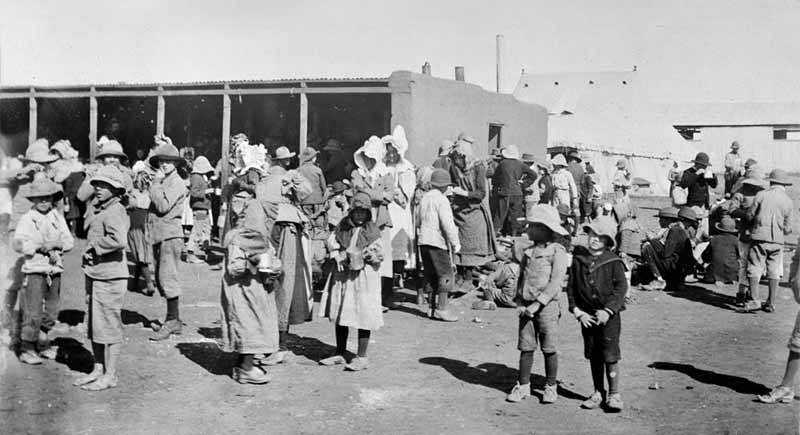
Boer women and children held in a British concentration camp during the Boer war
More than 26,000 Boer POWs were shipped to camps overseas in St. Helena, Ceylon, Bermuda, and India. The war finally ended in May of 1902, having brought a quarter million British troops into the fight. Volunteers from nine European countries fought for the Boers, though their governments did not officially side with President Kruger. The war brought death to about 300,000 horses as well as more than 30,000 women and children and at least 22,000 soldiers from all of the British Empire nations. It changed the political and national boundaries landscape of South Africa, and convinced the Boers to carry on war by diplomacy and pretended cultural amalgamation, from which they eventually took over political control later in the century. But that is another story


